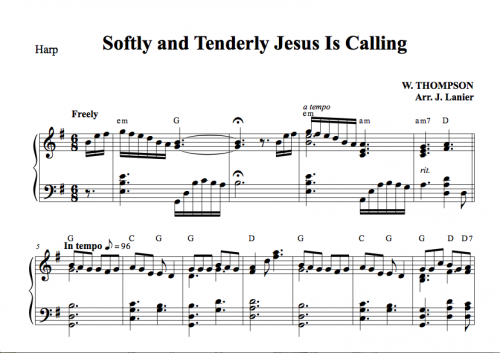 I’ve noted in the past that I see Jesus as so much more than a gentleman. I’ve preached more than once that Jesus isn’t just passively sitting outside a door and waiting for unbelievers to open up to him. He is not a passive Savior.
I’ve noted in the past that I see Jesus as so much more than a gentleman. I’ve preached more than once that Jesus isn’t just passively sitting outside a door and waiting for unbelievers to open up to him. He is not a passive Savior.
There are two hymns that many churches use during their time of invitation. They seem very similar but I think there is a world of difference between them. One I will happily approve, the other…if I’m being honest, makes me cringe a little.
The one that I’m not really comfortable with is The Savior is Waiting:
The Savior is waiting to enter your heart
Why don’t you let Him come in?
There’s nothing in this world to keep you apart
What is your answer to Him?
Chorus:
Time after time
He has waited before
And now He is waiting again
To see if you are willing
To open the door
Oh, how He wants to come in.
If you’ll take one step
Toward the Savior, my friend,
You’ll find His arms open wide.
Receive Him, and all of your darkness will end
Within your heart He’ll abide.
Chorus:
Time after time
He has waited before
And now He is waiting again
To see if you are willing
To open the door
Oh, how He wants to come in.
I don’t prefer this hymn because it makes Jesus far too passive and puts the keys way too much in the hands of the sinner. As I read the New Testament I see Jesus working and wooing but I don’t often see him waiting. Furthermore, I think this song doesn’t really do justice to the omniscience of our Savior. “To see if you are willing?!?!?” As if the Lord of the universe does not already know the human heart. This song puts Jesus in far too passive and unknowing of a role for my comfort.
Though I still don’t care for the lyrics about the Savior “waiting and watching” I will gladly use Softly and Tenderly:
-
Softly and tenderly Jesus is calling,
Calling for you and for me;
See, on the portals He’s waiting and watching,
Watching for you and for me.- Refrain:
Come home, come home,
You who are weary, come home;
Earnestly, tenderly, Jesus is calling,
Calling, O sinner, come home!
- Refrain:
- Why should we tarry when Jesus is pleading,
Pleading for you and for me?
Why should we linger and heed not His mercies,
Mercies for you and for me? - Time is now fleeting, the moments are passing,
Passing from you and from me;
Shadows are gathering, deathbeds are coming,
Coming for you and for me. - Oh, for the wonderful love He has promised,
Promised for you and for me!
Though we have sinned, He has mercy and pardon,
Pardon for you and for me.
I see the waiting and watching here a bit more like the role of the Father in the story of the Prodigal, it’s a bit more poetic than theological. Though it’s a subtle difference I think this song has much less of a passive Savior. Notice the verbs used here that Jesus is “softly and tenderly calling” and he is “pleading”. There is something here that we must not lose. Jesus truly does plead with and for sinners. He isn’t passively sitting by as the hyper-Calvinist or Pelagian and semi-Pelagian would have us believe. No, he is active. He is pleading.
John Piper made a similar point at the close of his sermon at T4G a couple years ago:
So I suppose what I’m doing here is pleading with those who are in my theological camp to not cast aside the truth of Softly and Tenderly because we are uncomfortable with the waiting Savior of the other hymn. And I’d plead with those of other theological persuasions to consider the words they are singing and to ask if it truly reflects how they Savior relates to sinners in the gospel…why not use Softly and Tenderly to make the same point you are trying to make with The Savior is Waiting.